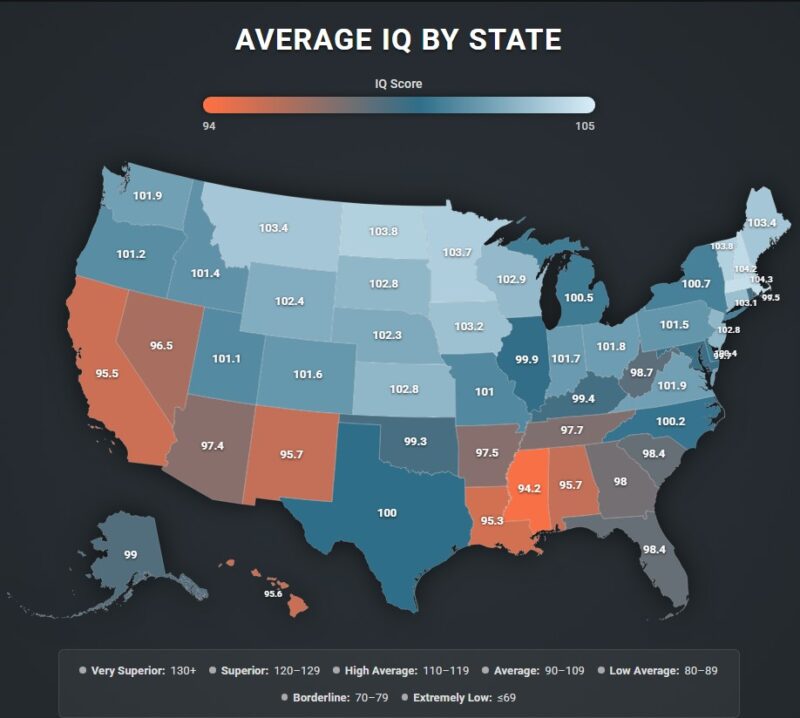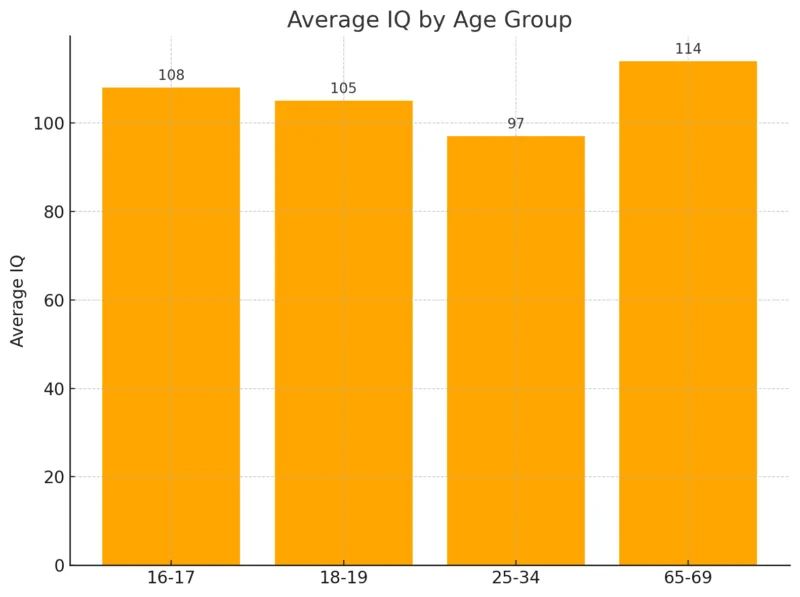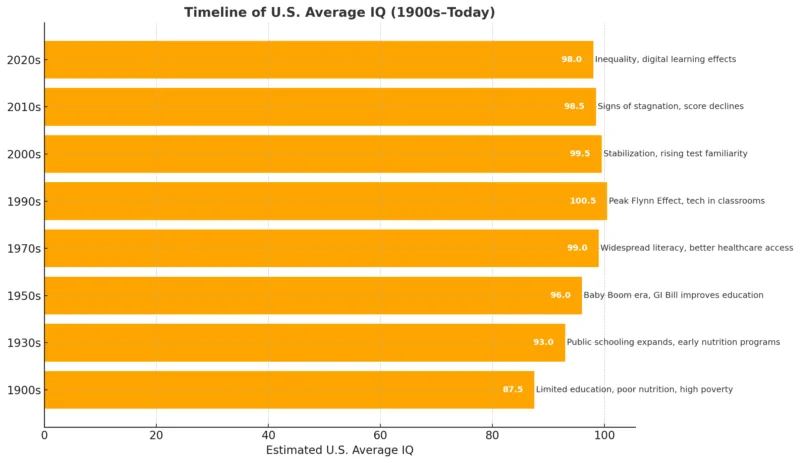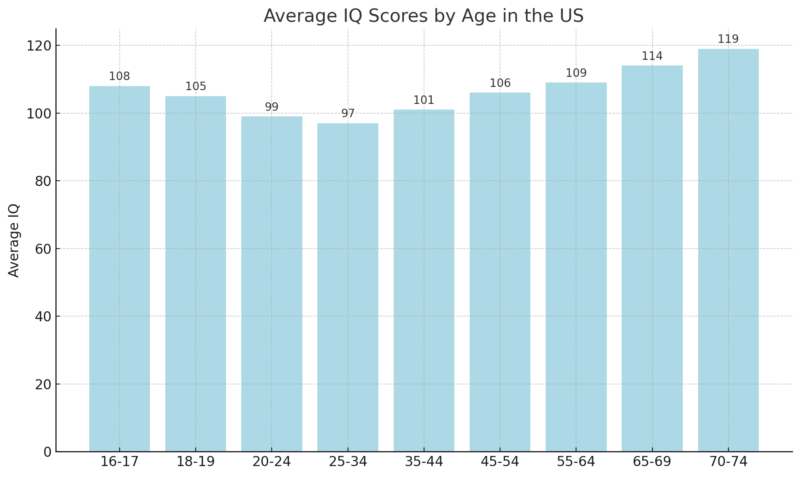The average IQ in the United States is approximately 98, based on the most recent data from World Population Review.
IQ tests are built around a standard average of 100, so small variations across populations are expected. In the U.S., men typically average around 99, while women score about 97, a difference that falls within the normal statistical range.
Globally, most countries cluster between 90 and 109.

Using data from MedicineNet and cognitive studies, we found that the U.S. average IQ has risen gradually over the past several decades.
It’s a long game the U.S. has been playing, and largely winning, thanks to programs that many take for granted. Head Start, a federal early learning initiative first introduced in the 1960s, has helped level the playing field for children in low-income households.
Expanded in the 2000s, the program has been shown to boost early test scores and improve long-term academic success, according to long-standing research.
Table of Contents
ToggleAt the state level, universal pre-K programs in places like Oklahoma and Georgia have delivered measurable gains, too.
Kids in these programs consistently perform better on vocabulary and reasoning assessments, building core cognitive skills that carry through elementary school and beyond.
But the brain boost hasn’t come from books alone. Nutrition programs have played a quieter, but critical role.
Initiatives like WIC (Women, Infants, and Children) and the National School Lunch Program have ensured that millions of children have access to key nutrients during their most important developmental years.
| IQ Range | IQ Classification |
| 130 and above | Very Superior |
| 120–129 | Superior |
| 110–119 | High Average |
| 90–109 | Average |
| 80–89 | Low Average |
| 70–79 | Borderline |
| 69 and below | Extremely Low |
Test Your Own IQ in 15 Questions
Now that you’ve seen how IQ levels are classified, find out where you personally fall on the scale. Take this quick, research-based IQ quiz and get your estimated score instantly.
Average IQ by State in the United States
| Rank | State | Average IQ |
|---|---|---|
| 1 | Massachusetts | 104.3 |
| 2 | New Hampshire | 104.2 |
| 3 | North Dakota | 103.8 |
| 4 | Vermont | 103.8 |
| 5 | Minnesota | 103.7 |
| 6 | Maine | 103.4 |
| 7 | Montana | 103.4 |
| 8 | Iowa | 103.2 |
| 9 | Connecticut | 103.1 |
| 10 | Wisconsin | 102.9 |
| 11 | Kansas | 102.8 |
| 12 | New Jersey | 102.8 |
| 13 | South Dakota | 102.8 |
| 14 | Wyoming | 102.4 |
| 15 | Nebraska | 102.3 |
| 16 | Virginia | 101.9 |
| 17 | Washington | 101.9 |
| 18 | Ohio | 101.8 |
| 19 | Indiana | 101.7 |
| 20 | Colorado | 101.6 |
| 21 | Pennsylvania | 101.5 |
| 22 | Idaho | 101.4 |
| 23 | Oregon | 101.2 |
| 24 | Utah | 101.1 |
| 25 | Missouri | 101 |
| 26 | New York | 100.7 |
| 27 | Michigan | 100.5 |
| 28 | Delaware | 100.4 |
| 29 | North Carolina | 100.2 |
| 30 | Texas | 100 |
| 31 | Illinois | 99.9 |
| 32 | Maryland | 99.7 |
| 33 | Rhode Island | 99.5 |
| 34 | Kentucky | 99.4 |
| 35 | Oklahoma | 99.3 |
| 36 | Alaska | 99 |
| 37 | West Virginia | 98.7 |
| 38 | Florida | 98.4 |
| 39 | South Carolina | 98.4 |
| 40 | Georgia | 98 |
| 41 | Tennessee | 97.7 |
| 42 | Arkansas | 97.5 |
| 43 | Arizona | 97.4 |
| 44 | Nevada | 96.5 |
| 45 | Alabama | 95.7 |
| 46 | New Mexico | 95.7 |
| 47 | Hawaii | 95.6 |
| 48 | California | 95.5 |
| 49 | Louisiana | 95.3 |
| 50 | Mississippi | 94.2 |
Massachusetts ranks as the highest IQ state in the U.S., with an average score of 104.3. That’s no accident; the state has long invested in education and innovation.
The Education Reform Act of 1993 significantly boosted public school funding and accountability, while access to world-renowned institutions like Harvard and MIT has helped cultivate a strong culture of learning.
New Hampshire ranks near the top for reasons that show up directly in spending and enforcement. The state spends about $20,000 per student per year, placing it consistently in the top 5 nationwide for per-pupil funding. More than 70% of that funding comes from local property taxes, which means districts with strong tax bases can sustain smaller class sizes and higher teacher pay.
Average class sizes in elementary grades are 18–20 students, compared to 23–25 in many Southern states. Teacher turnover is also lower: New Hampshire reports annual teacher attrition below 8%, compared to 12–15% in lower-ranked states.
On early literacy, the state enforces mandatory Grade 3 reading proficiency interventions, requiring students who fall behind to receive targeted remediation or summer programs. States that enforce third-grade reading gates consistently show higher later math and reasoning scores, because early literacy directly affects performance across all subjects.
Minnesota, Iowa, and Wisconsin rank high because they invested early and consistently in broad-based skill systems, not just elite education. Minnesota spends ~$14,500 per pupil, but the key difference is allocation: a large share goes to career and technical education (CTE) and community colleges. The Minnesota State system enrolls over 270,000 students annually, making it one of the largest unified public higher-education systems in the country.
These schools are directly tied to state workforce planning, meaning students repeatedly apply math, logic, and problem-solving in real settings like manufacturing, healthcare, and IT. Iowa and Wisconsin follow the same model, with CTE participation rates above 40% of high school students, compared to under 25% in many lower-ranked states.
Bottom Ones
At the bottom of the list, states like Mississippi and Louisiana are mostly paying the price for being late to the basics. Mississippi spends under $10,000 per student, Louisiana about $11,000, which is thousands less than top states.
Teachers leave more often too, with turnover over 15% a year, so kids constantly get new, inexperienced instructors. Mississippi didn’t seriously crack down on early reading until 2013, when it passed a law forcing schools to step in if kids couldn’t read by third grade.
States at the top had already been doing that for decades. Louisiana has had even more disruption, with school districts reorganized multiple times after Katrina and advanced classes mostly limited to bigger cities. None of this is about talent. It’s about systems that never stabilized.
California is a good reminder that famous universities don’t fix everything. Yes, it has Stanford University and the University of California system, but most students never come close to those pipelines. Class sizes regularly hit 26 or more kids, and school funding can differ by over $10,000 per student depending on the district. On top of that, more than 40% of students come from low-income households. When a huge part of the system is stretched thin, averages drop, no matter how elite the top looks.
That same thing is happening in Texas, Florida, and Georgia. These states are growing fast, but school systems can’t keep up. They spend roughly $10,500–$12,000 per student, below the national average, while adding students faster than they add teachers, classrooms, or early-education slots. Reading rules and preschool access are looser, so gaps show up early and never fully close. Some areas do great. Others don’t. The average lands in the middle.
Improving outcomes in lower-ranking states will require direct investment in teacher training, universal pre-K access, and school nutrition programs, approaches that federal evaluations show can close learning gaps within a generation.
You should also check out our map of the US population here.
IQ Categories US: What the Numbers Really Mean
Based on the standard bell curve model, IQ scores follow a predictable statistical pattern. Roughly 68.2% of all people fall within the 85–115 range, which is considered the normal IQ range (split evenly between 34.1% below and 34.1% above the mean of 100). This means most Americans cluster closely around the national average, not exceptionally high or low.
If we apply this curve to the U.S. population of about 342 million, the breakdown looks like this:
When viewed this way, the vast majority of people fall solidly within the “normal” range, with relatively small portions at either extreme. So, if the question is whether most Americans are “idiots,” the data clearly says no; statistically speaking, most of the population falls comfortably around the average intelligence level. The “Flynn Effect,” first described by political scientist James R. Flynn, refers to the steady rise in IQ scores observed throughout much of the 20th century. In the United States, average IQ scores increased by roughly 3 points per decade between 1930 and 1990. Researchers attribute this growth to improvements in education access, literacy, nutrition, and public health. However, recent studies suggest that this trend has slowed, and in some cases even reversed. For example, a 2018 analysis by researchers at Northwestern University and the University of Oregon found that average IQ scores in the U.S. began declining slightly after 1995, particularly in younger generations. This reversal mirrors findings in several European countries, including Norway, Denmark, and the UK. Experts argue that environmental factors, educational quality, and socioeconomic divides may now outweigh the earlier gains. According to NCBI research, cognitive abilities change throughout life, but IQ test scores remain stable because each age group is normed separately. In other words, a score of 100 always represents the average for that age group, whether you’re 16 or 70. Younger adults are generally quicker at solving new problems, a skill called fluid intelligence, which peaks in our twenties. But as we age, we gain crystallized intelligence, knowledge, vocabulary, and experience, which helps balance out the slower thinking speed. This means that while raw mental agility may decline slightly with age, experience, knowledge, and critical thinking continue to grow and contribute to overall intellectual performance. The test norms reflect this balance, which is why the average IQ remains close to 100 across all ages. Globally, the standard average IQ is set at 100, but real-world averages vary slightly by country depending on education, environment, and health. In the United States, for example, national studies typically find an average between 97 and 100, consistent with most developed nations. When psychologists talk about intelligence, they often break it into two main types: fluid and crystallized. Modern IQ tests measure both types through different subtests, such as pattern recognition, arithmetic reasoning, vocabulary, and comprehension. Importantly, these tests are standardized by age, which means the average score is always adjusted to stay around 100 for every age group. In practice, that keeps the playing field level: a 16-year-old and a 70-year-old are both compared to their peers, so age-related strengths (like speed in youth or vocabulary in later life) don’t skew the results. IQ scores are categorized to indicate various levels of intelligence. A score between 110-119 reflects above-average intelligence, while 120-140 represents giftedness. Scores over 140 classify individuals as geniuses, with only about 2% of the population reaching above 130, as per this research note. Scores below 70 indicate significantly lower intellectual abilities. Some historical figures, such as Albert Einstein and Ada Lovelace, were estimated to have IQs of around 160, while rare outliers, such as Terence Tao (IQ 230), are considered mathematical and intellectual prodigies. According to NCES and APA reports, test score gaps align more closely with household income, parental education, and school funding than with biology. When it comes to IQ, men and women are far more alike than different. Large-scale research, including reviews cited by the American Psychological Association and studies on PubMed, shows that the average IQ difference between genders is essentially zero. Any gap that does appear is usually less than one point, which is so small it falls inside the normal margin of error for IQ tests. Where researchers sometimes see a difference is not in ability, but in spread. Men’s scores tend to be a bit more spread out, meaning you’ll see slightly more men at both the very high and very low ends. Women’s scores cluster more tightly around the average. Even so, the two curves overlap almost completely. Some subtests show small, inconsistent patterns. Men may score a little higher on certain spatial tasks, while women often do slightly better on verbal fluency or processing speed. These differences depend heavily on the test and usually disappear when you zoom out to overall IQ. A large meta-analysis published in Intelligence that reviewed tens of thousands of test results summed it up clearly: differences in average IQ between men and women are negligible. In practical terms, gender tells you almost nothing about intelligence. The variation within each group is far greater than any difference between them. Income and parental education are the strongest predictors of IQ differences in the U.S. Children from high-income families can score up to 10–15 IQ points higher on average than children from low-income families. This reflects better nutrition, enriched learning environments, and greater access to healthcare. Urban children often score slightly higher than rural peers (1–3 points difference) due to greater school funding, teacher availability, and extracurricular opportunities. However, small rural states with strong community-driven education, like Vermont and North Dakota, often outperform large states with underfunded urban districts. An IQ score of 100 represents the average for each age group, meaning most people fall within 15 points of that mark, but it measures only certain cognitive abilities, not the full range of human intelligence. What researchers are actually measuring here is general cognitive ability, often called g. In plain terms, it’s the overall mental horsepower that shows up across different kinds of thinking tasks. To measure it, psychologists rely on well-established IQ tests like the WAIS for adults, the WISC for children and teens, and the Stanford–Binet. These aren’t casual quizzes. They have to be given and scored exactly as designed, by trained examiners, following strict rules so the results are reliable. All of these tests are built the same way under the hood. Scores are compared against people of the same age, with 100 set as the average and 15 points as the standard spread. Most tests break results into smaller pieces, such as verbal understanding or working memory, and then roll everything up into a single Full-Scale IQ score that reflects overall ability. Tests are administered under standardized conditions, and raw scores for each subtest (rk) are recorded. These raw scores are then converted to age-scaled scores using the test manual or item response theory (IRT) conversion tables: Index scores are calculated as weighted sums of the scaled subtests and converted to Index IQ values (mean 100, SD 15). A Full-Scale IQ (FSIQ) is then derived from the designated subtests using the publisher’s official algorithm, which may use classical norms or IRT-based theta values. Standard Error and Confidence Interval Most manuals report test reliability (ρ) and standard error of measurement (SEM). SEM = SDIQ × √(1 – ρ) (where SDIQ = 15) Exclude or flag test administrations conducted under non-standard conditions, such as fatigue, interruptions, coaching, or invalid timing Apply practice-effect corrections if the same test is repeated within a short period Use validated language editions only; results from unstandardized translations should not be interpreted as IQ scores. Sampling design: use probability-based samples that cover the target population through multistage stratified sampling by age, sex, region, and socioeconomic status (SES). Weights: compute design weights (wi) to correct for selection probability, nonresponse, and post-stratification to census margins. Weighted mean: Q̄ = (Σ wiQi) / (Σ wi) Variance and Confidence Interval: State or regional estimates: require representative samples or model-based small-area estimation (SAE) with clear uncertainty reporting. Report the mean, standard error, 95% CI, and sample size for each region. Trends and renorming: use the same test instrument and norm set across time points, or apply IRT linking/equating to ensure results remain on a common scale. If a test publisher provides Flynn Effect adjustments, document them explicitly; otherwise, treat renormed scores as a new metric. Verify measurement invariance and test for differential item functioning (DIF) across sex, language, race/ethnicity, and SES groups. If invariance does not hold, limit cross-group comparisons to invariant subtests or use statistical alignment methods to adjust results. Every reported mean (national, subgroup, or state-level) must include: Individual 95% Confidence Interval: Weighted Mean IQ: Replicate-Based Standard Error (BRR/JKn): The concept of IQ testing has a long history, beginning in the late 1800s when early researchers first attempted to quantify human intelligence. In 1905, Alfred Binet developed the first recognized intelligence test to help identify students needing academic assistance. Shortly after, German psychologist William Stern refined Binet’s work by introducing the concept of the “intelligence quotient,” a term that remains foundational to how we understand and measure IQ today. This innovation eventually led to the development of modern IQ score systems, including the creation of the IQ score chart by age, which helps compare cognitive performance across different age groups. Over time, IQ tests evolved to assess not just academic ability but also practical reasoning, emotional intelligence, and social skills. Tools like the IQ scale by age and various IQ score charts allow researchers to better understand patterns in intelligence throughout a person’s life. For example, when people ask “What is the average IQ?” or “What is the average IQ score by age?”, they often refer to these updated systems that provide a broader view of intellectual development over time. Typically, the average IQ globally is set around 100, but this can vary slightly by region. In fact, the average IQ in the USA tends to hover between 97 and 100, depending on the source and testing methods used. Although such numbers provide a general framework, many experts stress that intelligence cannot be fully captured by a single score. Despite advancements, critics argue that IQ tests remain limited in capturing the full spectrum of human abilities, overlooking critical factors such as creativity, emotional depth, and adaptive thinking – areas where traditional IQ tests may fall short.
IQ Range
Category
% of Population
Estimated Number of Americans
130–145
Genius
2%
~6.6 million
115–130
Gifted
14%
~48.6 million
100–115
Above average
34%
~116 million
85–100
Below average
34%
~116 million
70–85
Mildly challenged
14%
~48.6 million
55–70
Significantly challenged
2%
~6.6 million
U.S. IQ Over Time
Timeline of U.S. Average IQ (1900s–Today)
Average IQ Score by Age
Fluid vs. Crystallized Intelligence
IQ Scores and Intelligence Levels
IQ Scores
Intelligence Level
Between 110 and 119
Superior intelligence or above-average
Between 120 and 140
Superintelligence or gifted
Over 140
Genius or nearly genius
Between 80 and 89
Indicates dullness or lower average
Below 70
Definite low intelligence or “feeble-mindedness.”
Race, Gender, and Socioeconomic Disparities
Race and Ethnicity
Gender Differences in IQ
Socioeconomic Status (SES)
Urban vs. Rural
Group / Factor
Average IQ (U.S.)
Key Influences
White Americans
100–102
Education access, socioeconomic range
Asian Americans
102–105
High educational emphasis, cultural factors
Hispanic Americans
94–96
Language barriers, poverty rates
Black Americans
92–95
Historical inequities, underfunded schools
High-Income Families
105+
Enriched environments, healthcare
Low-Income Families
90–92
Poverty, limited resources
Urban Populations
99–101
More school resources, healthcare access
Rural Populations
96–99
Teacher shortages, but better outcomes in small states
Average IQ
IQ Measurement (Psychometric Standard)
1) Scope and Instruments
2) Individual Scoring Pipeline
95% Confidence Interval = FSIQ ± 1.96 × SEM3) Quality Control
4) Population Estimation (Means, Trends, and Group Comparisons)
Var(Q̄) = gᵀΣg
95% CI = Q̄ ± 1.96 × √Var(Q̄)5) Fairness and Validity Checks
6) Reporting Standards
7) Limitations
8) Key Formulas (for reference)
FSIQ ± 1.96 × 15 × √(1 – ρ)
Q̄ = (Σ wiQi) / (Σ wi)
SE(Q̄) = √(Σ cr(Q̄r – Q̄)²)
(where cr are replication scheme constants)The Evolution of Testing
Applications of IQ Testing
IQ tests serve multiple purposes, including:
- Evaluating cognitive abilities like memory, problem-solving, and processing speed.
- Assessing eligibility for jobs and educational programs.
- Diagnosing intellectual disabilities.
- Supporting psychological research.
Factors Influencing IQ
Several factors can affect IQ, including genetics, environment, health, education, and even musical training.
IQ typically increases with age but may decline in older adulthood. Cultural practices and brain anatomy also play roles in shaping an individual’s IQ.
Case Studies and Real-Life Examples
People with highest IQ🧠:
1. Wm. James Sidis – 250–300
2. Terence Tao – 225–230
3. Christopher Hirata – 225
4. Kim Ung Yong – 210
5. Garry Kasparov – 194
6. Marilyn Vos Savant – 190
7. Leonardo da Vinci – 190
8. Judit Polgar – 170
9. A. Einstein – 160–190
10. S. Hawking – 160— World of Statistics (@stats_feed) October 19, 2021
High-IQ individuals have contributed significantly to their fields, while others with average or below-average IQs have demonstrated success through creativity, perseverance, and other qualities, according to Verywell Mind.
Here are some notable examples:
| Name | IQ Score | Contribution |
|---|---|---|
| Albert Einstein | 160-180 | Revolutionized physics with the theory of relativity. |
| Terence Tao | 211-230 | Advanced mathematics in number theory and harmonic analysis. |
| Ada Lovelace | Estimated 170 | Pioneered computer programming as the first programmer. |
In contrast, individuals with average or below-average IQs show that intelligence alone does not define success:
| Name | IQ Score | Achievement |
|---|---|---|
| Richard Feynman | 125 | Nobel Prize-winning physicist known for quantum mechanics. |
| Muhammad Ali | 78 | World boxing champion, renowned for his strategic thinking and charisma. |
These examples highlight the multifaceted nature of intelligence, where qualities like creativity, determination, and emotional intelligence also play crucial roles.
What IQ Does Not Measure

IQ is a narrow measure of certain cognitive abilities; it’s not a complete reflection of human intelligence. Many critical skills that drive success and fulfillment lie outside what standardized IQ tests capture.
- Motivation and persistence – A person’s drive to achieve goals often predicts long-term outcomes better than test performance.
- Creativity – The ability to generate novel ideas or think divergently isn’t assessed by IQ tests, which emphasize convergent reasoning.
- Socio-emotional intelligence – Skills like empathy, self-awareness, and cooperation are key to leadership and mental health, yet remain outside the IQ framework.
- Practical and cultural knowledge – Working in complex social settings or adapting to real-world problems depends on life experience, not test-taking skill.
Psychologists often use complementary measures, such as emotional intelligence (EQ) scales, creativity inventories, or personality assessments, to build a fuller picture of an individual’s strengths.
IQ Beyond Academics

IQ measures cognitive skills like reasoning and memory, but life success involves more dimensions.
Key additional intelligence includes:
| Type of Intelligence | Description | Examples of Professions |
|---|---|---|
| Emotional Intelligence (EQ) | Ability to manage emotions and empathize with others. | Counseling, Leadership, Social Work |
| Practical Intelligence | Solving real-world problems effectively. | Entrepreneurs, Tradespeople |
| Creativity | Innovating and generating new ideas. | Artists, Engineers, Scientists |
For example, leaders like Steve Jobs leveraged creativity more than traditional cognitive skills, reshaping industries with innovative products, as noted in HBR.
While IQ correlates moderately with academic performance, other factors, such as adaptability and emotional resilience, are better predictors of career and personal achievements.
IQ vs. EQ Debate
IQ and EQ measure two very different sides of how people function.
IQ is about raw thinking skills, memory, logic, problem-solving, and how quickly you can work through information. It tends to predict things like school performance or how well someone handles technical, analytical tasks.
EQ, or emotional intelligence, is about people skills. It’s how well you read emotions, handle stress, empathize, and navigate social situations. This is the part of intelligence that shows up in teamwork, leadership, and relationships.
Research over the past two decades has made the difference clearer. High IQ helps you get in the door, but EQ often determines how far you go once you’re there. One well-known finding reported in Harvard Business Review showed that around 90% of top-performing managers scored high in EQ, even when their IQ scores were only average. In real life, being able to understand people often matters more than being the smartest person in the room.
Comparison of IQ and EQ
| Trait | IQ (Cognitive Intelligence) | EQ (Emotional Intelligence) |
| Measures | Logic, reasoning, problem-solving, and memory | Empathy, self-awareness, emotional regulation, and social skills |
| Predicts | Academic performance, technical skills | Leadership, teamwork, resilience, adaptability |
| Peak | Late adolescence (16–20 years) | Improves with life experience |
| Example Professions | Scientists, engineers, analysts | Managers, counselors, negotiators |
This debate highlights that while IQ remains important, adaptability, creativity, and emotional intelligence are often equally critical in determining life outcomes.
Nutrition and Cognitive Science

Nutrition plays a direct role in brain development and thus influences IQ scores. Several studies have linked dietary factors like omega-3 fatty acids, iodine, iron, and overall prenatal nutrition with higher cognitive outcomes.
- Omega-3 fatty acids (DHA, EPA): Essential for brain cell membrane function; supplementation in children has been shown to increase IQ by 3–4 points on average.
- Iodine: Critical for thyroid function; iodine deficiency in pregnancy is one of the leading preventable causes of lower IQ worldwide, reducing scores by 10–15 points in severe cases.
- Prenatal and Early Childhood Nutrition: A 2013 study in The Lancet found that children receiving balanced nutrition before age 5 scored significantly higher on later intelligence tests.
- Iron & Micronutrients: Deficiencies impair memory, attention, and problem-solving.
Nutritional Factors and IQ Impact
| Nutrient | Cognitive Role | Estimated IQ Impact |
| Omega-3 (DHA/EPA) | Brain development, memory | +3–4 points |
| Iodine | Thyroid, cognitive growth | +10–15 points if deficiency corrected |
| Iron | Memory, attention span | +2–3 points |
| Protein & Vitamins | Overall development | Supports stable growth |
These findings highlight that cognitive development is not fixed at birth; environment and nutrition can significantly influence outcomes. This makes public health programs, prenatal care, and school nutrition critical tools for raising average IQ.
Global Comparisons of Average IQ

Average IQ varies significantly worldwide due to educational quality, healthcare, and socio-economic factors.
When examining global comparisons of IQ, it becomes clear that average IQ scores vary significantly across different countries and regions. These variations are strongly influenced by several key factors, including access to quality education, availability of healthcare, nutrition, economic development, and social stability.
Countries with well-funded school systems, comprehensive healthcare, and stable living conditions, such as Singapore, Japan, and South Korea, tend to report the highest average IQ scores, often exceeding 105. In contrast, nations with limited educational resources, widespread poverty, and health challenges generally display lower averages, often below 90.
For example, while the average IQ in the USA is approximately 98, countries like Singapore and Japan have higher averages at around 108 and 106, respectively. European nations such as Switzerland, the Netherlands, and Germany typically range between 100 and 104, reflecting strong investments in education and child development.
Meanwhile, many developing countries, particularly in parts of Africa, Latin America, and Southeast Asia, report lower average IQ scores due to systemic barriers like underfunded education systems, malnutrition, and limited access to early childhood care.
Below is a table comparing the U.S. to other countries:
Cultural and Environmental Impacts
- Education: Countries with well-funded schools and rigorous curricula produce higher IQ averages according to the NCBI.
- Healthcare: Access to good nutrition and prenatal care contributes to brain development.
- Environment: Stable, enriching environments foster better cognitive outcomes.
Statistics and Visual Insights
Based on data, IQ changes across the lifespan:

The data suggest that IQ peaks in adolescence and increases slightly in later life due to accumulated knowledge and experience.
Global Distributions
Here’s a simple representation of global IQ averages:
- Above 105: Singapore, Japan
- 90-105: Most European countries, the United States
- Below 90: Developing nations with limited access to education and healthcare.
Limitations and Misconceptions
@rorysutherlandclips IQ tests are only a small piece of the puzzle #rorysutherland #rorysutherlandclips #fyp #foryou #podcast #podcastclips #marketing #iqtest #gamer ♬ Cheek pop – unknown
While IQ tests measure certain intellectual abilities, they do not encompass all aspects of intelligence, such as creativity, emotional intelligence, or common sense.
High IQ scores do not guarantee success, especially in stressful or practical scenarios.
Furthermore, reliance on IQ scores can lead to biases and societal prejudice.
Intelligence is multifaceted, and qualities like adaptability, emotional health, and judgment extend beyond what IQ can measure.
Discover Your IQ Potential in Minutes
You’ve learned what the numbers mean, now it’s time to see where you stand. Try this quick, science-based IQ quiz and get your personalized score right away.
FAQs
IQ scores below 70 are classified as intellectual disabilities:
- 71-84: Borderline intellectual functioning
- 50-70: Mild intellectual disability
- 35-50: Moderate intellectual disability
- 20-35: Severe intellectual disability
- Below 20: Profound intellectual disability
While IQ is largely innate, scores can be enhanced through practice and knowledge acquisition. Ways to improve include:
- Learning new skills, such as music or sports.
- Engaging in puzzles, word games, and brain exercises.
- Expanding knowledge through reading and learning new languages.
- Developing verbal skills and maintaining overall health with balanced nutrition, regular exercise, and sufficient sleep.
As of 2025, the average IQ in the USA remains around 98, consistent with previous years. Although IQ tests are calibrated to center around 100, small shifts over time reflect changing demographics, education quality, and healthcare improvements. Recent studies suggest that despite global fluctuations, the US average IQ 2025 is holding steady, with ongoing efforts to close gaps related to socio-economic inequality.
In 2024, the average IQ of Americans was recorded at approximately 98, slightly below nations like Singapore (108) and Japan (106), but in line with most developed countries. Although the average IQ in America 2024 is lower compared to some East Asian countries, the United States leads in measures of innovation, creativity, and educational opportunity, which are also critical forms of intelligence not fully captured by IQ alone.
According to recent rankings, states with the highest IQ scores include:
-
Massachusetts (104.3 average IQ)
-
New Hampshire (104.2)
-
North Dakota and Vermont (both 103.8)
These states tend to have strong public education systems, robust healthcare access, and higher socio-economic standards, all of which contribute to better cognitive outcomes.
While the average American IQ has remained close to 98-100 for decades, experts note gradual improvements due to better access to education, healthcare, and nutrition, a phenomenon known as the Flynn Effect.
However, in recent years, the rate of increase has slowed, leading researchers to monitor trends more closely as the country faces new educational and societal challenges.
A normal average IQ score typically falls between 85 and 115, capturing about 68% of the population. The absolute average IQ score is 100, but slight variations by age group, geography, and socio-economic background are normal.
There are significant differences in average IQ in America by state. States with high educational funding, strong healthcare access, and low poverty rates generally report higher average IQs. Conversely, states facing educational underfunding and healthcare disparities tend to score lower.
For instance:
-
Massachusetts: Highest (104.3)
-
Mississippi: Lowest (94.2)
Disclaimer: On IQ Rankings and Socioeconomic Factors

Comparing average IQ scores across countries sounds simple, but it’s actually one of the most debated topics in psychology. These numbers don’t exist in a vacuum – they’re deeply tied to how societies educate, feed, and care for their people.
Differences in school quality, healthcare, nutrition, and family income can all shape how individuals perform on standardized cognitive tests.
In many cases, what looks like a national IQ gap is really a reflection of unequal opportunity. Children who grow up in countries with strong public education systems and consistent healthcare tend to perform better – not because they’re “smarter,” but because they’ve had better chances to learn and thrive.
Both the OECD and the World Bank have cautioned against interpreting these rankings as innate differences in intelligence. For example, OECD’s Programme for International Student Assessment (PISA) reports show that teacher quality, early learning access, and school funding have a measurable impact on test outcomes.
The World Bank’s Human Capital Project also demonstrates that nutritional deficiencies and limited schooling can lower average cognitive performance by the equivalent of several IQ points.
So when we talk about IQ by country, we’re really talking about social investment, how much a society supports education, health, and equal access, not biological limits.
Methodology
This article uses a descriptive and comparative methodology supported by publicly available data from multiple credible sources.
Primary datasets include:
- MedicineNet (2024) – for the U.S. average IQ benchmark (national mean and gender breakdown).
- DataPandas (2024) – for the state-level IQ averages, based on aggregated psychometric data and standardized testing samples.
- NCBI and APA publications (2018–2023) – for age-related cognitive performance and psychometric normalization practices.
- Verywell Mind and Harvard Business Review – for qualitative interpretation of intelligence categories and non-cognitive factors.
The reference year for national and state IQ comparisons is 2024–2025, using the most recent datasets available from the cited sources.
IQ values were aggregated by state using weighted means from psychometric data adjusted for population size and sampling variance, where available.
All figures were rounded to one decimal place for consistency with the original reporting standards.
Because IQ distributions are age-normed, this analysis interprets scores in relation to standardized test norms (mean = 100, SD = 15).
Uncertainty arises from variations between testing instruments (e.g., WAIS-IV, WISC-V, Stanford–Binet) and differences in sample representativeness across states.
The estimated margin of uncertainty in reported averages is approximately ±1.5 IQ points at the state level and ±1 point at the national level.
This methodology aims to provide a comparative snapshot of cognitive performance trends across U.S. states, acknowledging limitations in direct comparability due to dataset heterogeneity and the absence of a single unified federal IQ dataset.
References
- American Psychological Association. (n.d.). Men and women: No big difference. https://www.apa.org/topics/personality/men-women-difference
- DataPandas. (2024). Average IQ by state. https://www.datapandas.org/ranking/average-iq-by-state
- Harvard Business Review. (2012). The real leadership lessons of Steve Jobs. https://hbr.org/2012/04/the-real-leadership-lessons-of-steve-jobs
- Lynn, R., & Irwing, P. (2004). Sex differences on the Progressive Matrices: A meta-analysis. Intelligence. https://emilkirkegaard.dk/en/wp-content/uploads/R.-Lynn-and-P.-Irwing-Sex-differences-on-the-Progressive-Matrices-a-meta-analysis1.pdf
- MedicineNet. (n.d.). What is the normal range for IQ? https://www.medicinenet.com/what_is_the_normal_range_for_iq/article.htm
- National Center for Biotechnology Information. (n.d.). The relationship between age and cognitive development. https://pmc.ncbi.nlm.nih.gov/articles/PMC3650086/
- National Center for Biotechnology Information. (n.d.). Global IQ averages and educational impact. https://pmc.ncbi.nlm.nih.gov/articles/PMC6088505/
- OECD. (n.d.). Programme for International Student Assessment (PISA). https://www.oecd.org/en/about/programmes/pisa.html
- Verywell Mind. (n.d.). Are people with high IQs more successful? https://www.verywellmind.com/are-people-with-high-iqs-more-successful-2795280
- World Bank. (2020). The human capital index 2020 update: Human capital in the time of COVID-19. https://documents1.worldbank.org/curated/en/456901600111156873/pdf/The-Human-Capital-Index-2020-Update-Human-Capital-in-the-Time-of-COVID-19.pdf
- Study.com. (n.d.). IQ scores form a normal distribution (μ=100, σ=15): What proportion scores above 140? https://homework.study.com/explanation/iq-scores-form-a-normal-distribution-with-mu-100-and-sigma-15-individuals-with-iqs-above-140-are-classified-in-the-genius-category-what-proportion-of-the-population-consists-of-geniuses-a-0-9962-b-0-5038-c-0-4962-d-0-0038.html
Related Posts:
- State-by-State Breakdown - Average Cost of Hospital…
- Average Marriage Age in the US - Latest Trends by…
- Most Popular Side Hustles in the US, State-by-State…
- How Much Money Does the Average American Have in…
- The Average Age of Retirement in the United States…
- What Is the Average Human Height, and How Has It…
















